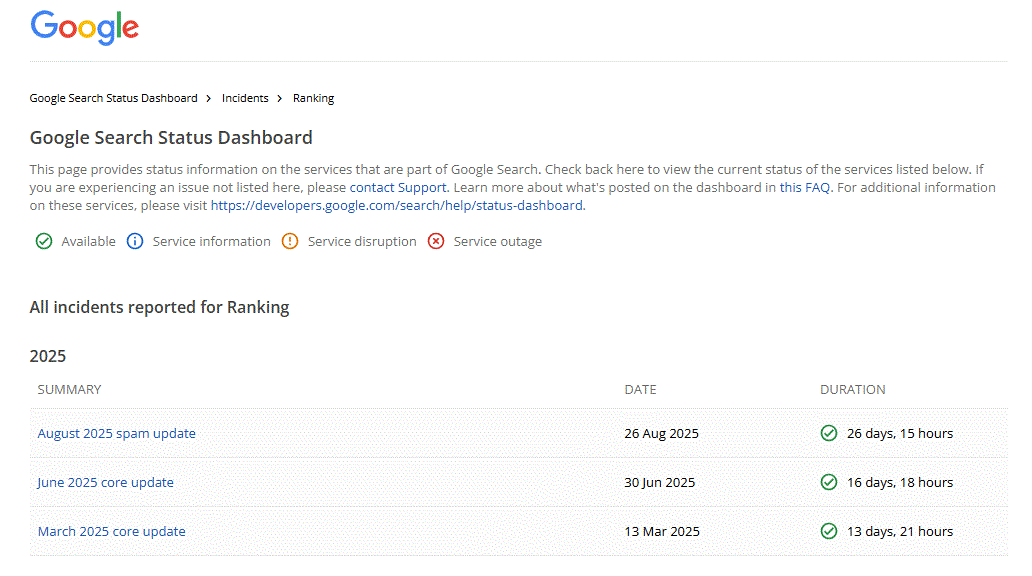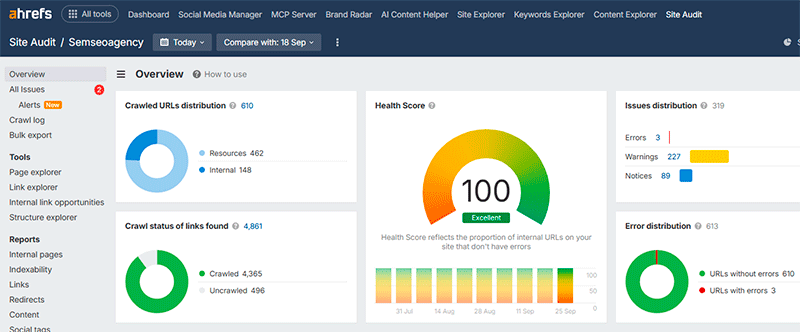What is an SEO agency

«An SEO agency boosts your brand’s visibility and attracts the customers that matter most»
An SEO agency is a company that works with your website or e-commerce to achieve the best results on search engines like Google or Bing by improving your organic visibility. This definition would have been accurate two years ago, but today the scope must also include LLMs such as ChatGPT, Claude, and others.
The goal of achieving strong visibility on Google or LLMs is essential for any business, as that visibility must translate into sales and business growth. Moreover, SEO should not be limited to attracting visits but also to improving their conversion rate, in other words, ensuring that the visitors you attract are the right ones and that they convert into customers. To achieve this, SEO must be combined with CRO and other strategies.
This challenge requires advanced technical knowledge, in-depth analysis, digital strategy expertise, and the ability to continuously adapt to algorithm changes. Just in the past few months, there have been two major Google core updates (March and June) that are large-scale changes to Google’s algorithm that alter how results are ranked; and many more of smaller impact. You can view them directly on the Google search status dashboard page.

For all these reasons, SEO is best handled by a specialized SEO agency rather than in-house. An SEO agency should serve as a strategic and specialized partner, collaborating closely with your company because the agency-client relationship is fundamental to success.
An SEO agency should not do only SEO
As we’ve explained, an SEO agency (Search Engine Optimization) is a company specialized in the design, execution, and management of strategies aimed at improving the organic positioning of websites in Google and similar search engine results.
However, the scope of an SEO agency must go far beyond simply ranking keywords. A web positioning agency must understand the client’s business, consumer behavior, competitors, and the evolution of the market in which it operates. Ultimately, the goal is to align organic visibility with business objectives and directly contribute to client acquisition, sales growth, and brand strengthening.
Main SEO services offered by an SEO Agency
A professional SEO agency structures its work around several areas of specialization. Each addresses specific objectives within an integrated strategy.
Keyword research and strategy
Keyword research is the foundation of any SEO strategy. The SEO agency analyzes the search behavior of the target audience, identifies terms with purchase intent, informational or transactional searches, and evaluates the volume, competition, and ranking difficulty of various keywords.
In addition to the main keywords, long-tail variations, local searches, semantic entities, and related topics are considered to build a sufficiently broad set that covers the client’s business needs. This allows the creation of a strategy focused not only on ranking but also on attracting qualified traffic with high conversion potential.
Technical and strategic SEO audit
The technical and strategic audit is an essential step in any SEO project, showing us the website’s current technical state. This SEO audit involves an in-depth analysis of the website from different perspectives:
- Crawling and indexing: evaluates how search engine robots access the site, analyzes whether there are crawl errors, blocks, or improperly indexed content.
- Information architecture: reviews the site’s hierarchical structure, the organization of categories and URLs, and content depth.
- Technical performance: analyzes aspects such as loading speed, Core Web Vitals, mobile optimization, security (HTTPS), or structured data implementation.
- Content analysis: studies the quality, relevance, and optimization of current texts concerning user searches.
- Link profile: reviews the domain’s authority, the quality of existing inbound links, and potential risks of toxic links.
The audit allows you to establish a precise diagnosis and design a prioritized action plan.
Technical SEO and on-page optimization
Once the audit is complete, it’s time for technical SEO. The site’s infrastructure must be optimized for crawling, indexing, and understanding by search engines. Technical SEO includes, among other tasks:
- Improving loading speed and performance.
- Proper structuring of headings, meta tags, and attributes.
- Implementation of Schema.org and structured data markup.
- Optimization of internal linking architecture.
- Control of duplicate and canonical versions.
- Proper configuration of sitemap.xml and robots.txt.
Additionally, on-page SEO focuses on optimizing each individual page: from content to link structure, including key elements such as titles, descriptions, and semantic structure.
Content strategy focused on ranking
The phrase "Content is King" was first used by Bill Gates in an essay in 1996 (Bill Gates' 1996 essay, owned by Microsoft). This iconic phrase remains true today, meaning that content continues to be one of the most relevant ranking factors in search engines. An SEO agency not only optimizes existing texts but also designs an editorial strategy aligned with the conversion funnel. This includes:
- Creating informational, commercial, and transactional content.
- Developing topic clusters and topic authority strategies.
- Semantic optimization using advanced SEO techniques (entities, NLP, TF-IDF).
- Updating and recycling older content to improve performance.
- Reinforcing content credibility through proper application of EEAT principles.
The goal is for each piece of content to provide value to the user and strengthen the domain’s thematic relevance in search engines, while also reinforcing the brand’s expertise. This is why the company hiring the SEO agency must contribute its market knowledge and not leave content creation entirely in the hands of the SEO consultant.
Link building and authority strategies
The domain’s reputation or authority is a relevant ranking factor. If a website is authoritative, it is expected to have links from other websites as a sign of relevance and trust. Therefore, the SEO agency must design campaigns to acquire natural, high-quality links from relevant and thematically related sites. These strategies include publications in specialized media, strategic collaborations, guest posting, and creating linkable assets.
The process is managed using metrics such as domain authority (DA/DR), topical relevance, referring domain traffic, and anchor text profile, while avoiding penalizable practices.
Local and international SEO
If a business has a physical presence or wants to attract clients based on proximity, local SEO strategies are applied, optimizing Google Business profiles, NAP citations, and geolocated content. For companies with an international presence, SEO becomes more complex, requiring the development of international SEO strategies with multilingual architecture, hreflang tags, and, above all, cultural and semantic adaptations for each market.
How an SEO agency works: phases and methodology

Although each agency may have variations, the SEO process is usually structured into clearly defined phases:
Phase 1: Initial analysis and goal definition
The technical audit, market research, and competitor analysis are carried out. From there, specific objectives (organic traffic, lead generation, sales growth) are defined, and key KPIs are established.
Phase 2: Strategic SEO planning
The SEO roadmap is designed, detailing actions by priority, deadlines, and responsibilities. Here, target keywords, content strategy, editorial calendar, technical adjustments, and link-building strategy are defined.
Phase 3: Technical implementation
Errors identified during the audit are corrected, site architecture is optimized, technical performance is improved, and necessary configurations are applied to facilitate crawling and indexing.
Phase 4: Content optimization
Existing content is created or adjusted based on the keyword strategy and search intent. Titles, headings, semantic structures, and structured data are optimized.
Phase 5: Authority and popularity strategies
The link-building strategy is executed, content is published on relevant sites, and inbound and outbound links are monitored.
Phase 6: Monitoring, reporting, and continuous improvement
SEO is an iterative process in which the SEO agency continuously monitors key performance indicators, adjusting the strategy based on results and Google algorithm changes. This work should be reflected in detailed, periodic reports that include key metrics such as keyword positions, organic traffic growth, traffic conversion rate, CTR in search results, page indexing speed and coverage, as well as link profile and domain authority.
Tools used by an SEO Agency
One of the advantages of working with an SEO agency is that they combine various premium tools specialized in each phase of the project, tools that would be very expensive for a company to acquire independently. The most common include:
- Technical analysis and crawling: Screaming Frog
- Position and visibility monitoring: Sistrix, Semrush, SeRanking, Dinorank, or Ahrefs.
- Keyword research and semantic analysis: Google Keyword Planner, KWFinder, Surfer SEO.
- Link analysis: Ahrefs, Majestic.
- Performance and traffic measurement: Google Analytics, Google Search Console.
- Core Web Vitals optimization: PageSpeed Insights, Lighthouse.

These tools make it possible to obtain precise data, make evidence-based decisions, and measure the real impact of each action.
The SEO agency as a strategic growth partner
As you’ve seen, an SEO agency is not just an external provider; it’s a strategic partner that works to ensure your brand’s visibility translates into business growth and long-term sustainability. Investing in SEO with a strategic partner you connect with does not mean paying for clicks - it means building a solid digital ecosystem that continuously generates business opportunities. The difference between appearing on the second page of Google or leading the market can depend on having a specialized team that understands both search engines and your company’s objectives.

Francesc Sánchez — CEO
I am passionate about strategic consulting and digital marketing, specialising in SEO. I love automation and the intelligent use of AI.




